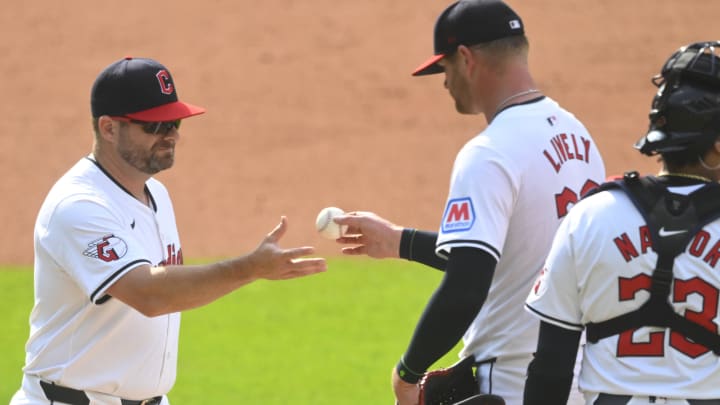Guardians May Have Disappointing Trade Deadline For This Reason

It's July, and the Cleveland Guardians are one of the best teams in baseball. How many people had that on their bingo card back in March?
The Guardians own the American League's best record at 53-30 entering Wednesday's action and hold a comfortable six-game lead over the Minnesota Twins for first place in the AL Central.
In spite of that, Cleveland is still clearly lacking in some crucial areas.
The Guardians obviously need more starting pitching, and signing Matthew Boyd coming off Tommy John surgery coupled with the return of Gavin Williams is not the answer.
Cleveland could also stand to improve its offense. For as terrific as the triumvirate of Jose Ramirez, Steven Kwan and Josh Naylor has been, there is a dearth of depth in the Guardians' lineup, and if they really want to challenge for a World Series, they probably need another bat (or two).
The good news is that Cleveland still has several weeks to improve its roster, as the MLB trade deadline isn't until July 30. The bad news is that it may be a tough feat to achieve.
Why? Well, thanks to the addition of the third Wild Card (which has been outstanding for the sport), the pool of sellers has been dramatically diminished (which has been bad for the trade deadline). Fringe teams that typically would have been out of it this time five years ago now have a legitimate chance of making the playoffs, which decreases their motivation to sell.
And for the teams that are going to be sellers? You know, the Chicago White Sox, Miami Marlins and Colorado Rockies of the world? They get to ask for a premium because they hold the key to the market. The very few sellers that will exist midsummer have a monopoly on the trade front, and if you want to acquire even a moderately decent player, you are going to have to pay through the nose.
We've already heard that the starting pitching market is brutal. Not just because there aren't many legitimate starters available, but because the teams that do have certain pitchers up for grabs are asking for an arm (no pun intended) and a leg in return.
Let's take the New York Mets, for example.
This is a ballclub that appeared to be out of the race a few weeks ago, but a recent hot streak has vaulted the Mets back into Wild Card contention and potentially out of the seller community that appears to be shrinking rather than growing (remember when people thought the Houston Astros might move Justin Verlander?).
But let's just say New York goes into a bit of a tailspin over these next three weeks (which is entirely possible) and decides to put right-hander Luis Severino on the trade block. Severino is having a good year, but he is an injury-prone player who has thrown 100 innings just once since 2019. What's more, he is on a one-year deal, making him an essential rental.
In previous eras, a pitcher like Severino could probably be had for some mid-tier prospects. But now? In 2024? He will command a hefty price tag.
Or we can look at the Chicago Cubs and Cody Bellinger (not a pitcher, but the same logic applies).
The Guardians have been mentioned as a potential landing spot if the Cubs decide to move Bellinger, but at what cost? Bellinger isn't having a great year (.743 OPS), but he did win a Silver Slugger last season, and he has an MVP in his rearview mirror. Plus, he's a left-handed hitter. Chicago will probably ask for the farm for him, even though he just signed a three-year, $80 million deal.
Cleveland doesn't have a great farm system (MLB.com recently ranked it 19th), so it may be exceedingly difficult for the Guardians to land a truly impactful player between now and the deadline.
Again, there was a time when you could swing deals for solid guys—pitchers and position players—in the middle of the season. That time wasn't long ago, either. But now? The MLB landscape has dramatically changed, placing even more importance on what teams do in the offseason.
It used to be that contenders could say, "It's okay. We'll just see what's available at the trade deadline." That simply isn't the case anymore. We are reaching a point now that very, very little is available.
Even the Marlins, who look every bit the part of prime sellers, may end up only moving a couple of pieces thanks to a plethora of injuries that have ravaged their starting rotation. Remember when it looked like Jesus Luzardo would be the top pitcher on the trade market? Well, he recently hit the 60-day injured list. So yeah. He's staying put. Braxton Garrett is hurt again, too.
The Guardians must get very creative if they want to significantly augment their roster in the coming weeks. It's not going to be easy.
On the bright side, it's a pretty level playing field. Cleveland is not the only club dealing with these issues. Fellow AL contenders like the New York Yankees and Baltimore Orioles will encounter the same problems.
We still have to see how everything shakes out, but there seems to be a sizeable chance that the Guardians will look nearly identical on Aug. 1 as they do today.
